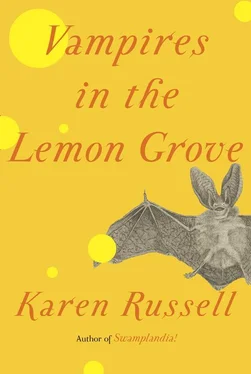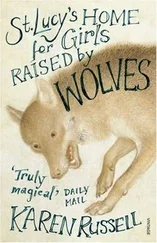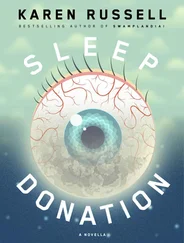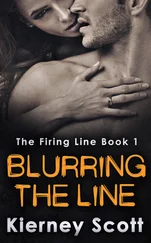He shuffles toward me, removing his hat.
“Inspector?”
We shout this at the exact same moment. Then we’re left to gape at each other. White frogs of breath leap from my mouth. He doesn’t seem to breathe at all.
“Hello, sir,” I manage, and hold out a numb hand. The feeling returns to my stiff arm, and I bite down as pain rips along the bone — the polite smile, by some miracle, still on my face. “I guess we are both mistaken, sir.” (“Etiquette will take possession of you at the oddest times, won’t it, Miles?” Ma murmured once, when I caught her apologizing to a cupful of grasshoppers before drowning them in kerosene.)
Well, the stranger doesn’t return any of my friendliness. I’m Miles Zegner , I was about to offer, but I swallow it back. And I don’t ask for his name, either; a queasiness stirring in my gut warns me that I might not want to know it.
I’m certain that I’ve never seen this man on any homestead around here — but he’s dressed for the work, with his cuffs pushed to the elbows like any man in Hox; and like Pa he has the settler’s scar from the moldboard plow. He’s a southpaw. A sodbuster. One of us. A newcomer to the Hox River Settlement? (No, no , a little voice in me whispers, not new .) His eyes have the half-moon markings of a pronghorn antelope. He looks like he’s been awake for generations.
“You did not see a horse come through here, sir?”
“No horses. No Inspectors on horseback. No bats hanging from Inspectors’ noses.” He giggles.
“Are you all right, sir? Are you lost, too?”
Then the man says something in a jangly tone that I can barely understand, it’s so reedy and high. His voice is almost female, or animal, and the words make no sense whatsoever.
“Green me that wheel!”
“Pardon, sir?”
“Grease me that doe!”
I swallow hard.
“Sir, I am not understanding you.”
He draws a rectangle in the snow-dotted air and laughs; I swear I see a nugget of earth tumble out of his mouth. His lips are plush and smeared.
“But we need to wake up now, don’t we, boy? This is quite a day! It sounds like you and I are on the hunt for the same fellow. The Inspector is coming shortly, you see. Yes. I believe that he will be coming very soon.”
A fine gray ash is blowing from his curly hair, which looks like it is or once might have been yellow. The wind shifts and my nose wrinkles — there’s a smell, a putrescence, a mix of silage and marrow and a hideous sweetness, like the time a family of rats suffocated in our sod walls. One hand keeps fussing with his trousers, which he’s belted with a double loop of rope — his rib cage is almost impossibly narrow. If he were any thinner I swear he’d disappear. My mother’s voice drifts into my ear: “He’s a rumor, he’s smoke …” But his eyes are solid marbles, and his fingernails are real enough to be broken. His left hand closes on the handle of a hay knife.
“That’s a beautiful knife.”
He smiles at me.
“And you say you are also”—I cough—“waiting on the Inspector? You’ve been here for the five years, then?”
The handle of the knife is some kind of clover-toned wood. The blade looks like a long tooth.
“Oh!” The man laughs. “Even longer. Long enough to lose track of the days and seasons entirely. Suns, moons, droughts, famines — who’s counting?” He laughs again. The sun is stronger now. It shifts above us but never seems to settle anywhere on him.
“Where is your quarter section?”
“You’re standing on it.”
“Oh.” But where are we? “Is anyone else here? Don’t you have a family?”
“I may have.” He frowns and licks his black lips, as if he truly cannot remember. “Yes! I did have a family. Parents, certainly. They are buried back east. And a wife … yes!” He beams at me. “I did have one. A wife, but she wasn’t worth much. Women can be so impatient, Miles. And children — I believe we had several of them.”
He begins to shake his thin shoulders in the silvery h-yuk, h-yuk, h-yuk of a coyote. His tongue surprises me — I guess part of me thought he was a ghost, a creature like my sisters. But his tongue is as red as sunrise in his dark face. He is alive, no question. I feel relieved, then scared for fresh reasons.
“Ah, children —that was a wash.” This time when he opens his mouth, his voice is all throat.
“You shouldn’t laugh at that.”
“What’s the matter?” He grins, trying to rib me with his elbow. “Out here we need a sense of humor, isn’t that so?”
The violence of his laughter sprays dirt into the air; I cough again and think with horror that I’m breathing a powder from his body.
“Your kids all died?”
He shrugs.
“Sons or daughters?”
“Sons and daughters, yes. Sicklings. Weak ones. None lasted.”
“What happened to your wife?”
“She lost faith.” He lets out a theatrical sigh. “Lost her will to prosper. Became a madwoman, if you want to know. I had to make a break with her. Had to make a fresh start”—I wince; he’s talking just like Pa now—“drove her off. Or rather, plowed her under. The West is a land of infinite beginnings, isn’t that right, Miles Zegner? Pick up, embark again, file a preempt, stake a new claim”— Did I tell him my name? — “and after many lonely seasons, I have fulfilled each of the Act’s stipulations. See this?”
He’s holding something out to me — half a piece of paper. I take it with a trembling hand and recognize the text of the Homestead Act. I marvel at the document’s creamy white color, its ink-bleeding signature — if I didn’t know better I’d swear it was the original writ. How did this dirt-streaked stranger acquire such a thing — a law that looks like it was snatched from the president’s own desk?
SEC. 3. And be it further enacted, that the Register of the Land Office shall note all such applications on the tract books and plats of his office, and keep a register of all such entries, and make return thereof to the General Land Office, together with the proof upon which they have been founded …
The man trails a slushy finger down to the word glass . Every claim shanty or dugout must have a real glass window, a whimsical clause that has cost lives out here. I stare at the sod and the black ribbon of blood under his nail.
“So you see that I’m in real need here, Miles. All the other proof I have ready for this Register, the Inspector. The last thing I need is a window.” He contorts his mouth into a terrible smile.
My father’s instructions move my jaw, push out my breath: “Listen, sir. I have a Window. If the Inspector is coming, I can loan it to you. We can fix it so it looks like it belongs to your dugout. So you can prove up.”
“You would do that? For me?”
His eyes brighten fervidly in his grimy face, but not with happiness — it’s more like watching sickness take root and germinate, blazing into a wildfire fever.
I nod, thinking about Pa. For all his charity with the Hox glass, I’m the one who bears the risk of it.
Without my awareness, we have begun moving; and our march feels almost like a pleasant walk, just a normal trip to deliver the Window to a neighbor. I picture the Florissants’ claim swimming toward me out of the plains. The sun casts itself like a spell across the land — as if the blizzard never happened, as if Nore was not lost. The sky out west has so many tricks to make a person forget what he’s just lived through.
We enter a clearing. Shortgrass and green ash are planted in tiers as a windbreak, and I can see what must be his dugout.
There are no bones in his fingers. He is made of dust. If it ever rains again he will seep back into the earth .
Читать дальше












